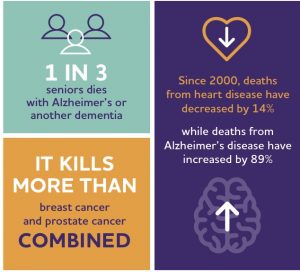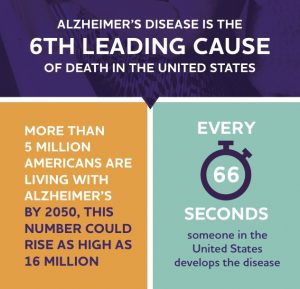
Photo credit Matthias Zomer
According to the Alzheimer’s Association, of the estimated 5.4 million Americans that have the disease, 5.2 million people are over age 65. One in 7 over age 71 have some form of dementia. There are no effective treatments for dementia, but several studies over the past years have shown promise in delay of onset and prevention including:
- Preventing and treating diseases that damage the vascular system and thus the brain: hypertension, heart disease, stroke, metabolic syndrome, diabetes, and high cholesterol
- Cognitive training, formal education and complex work that exercises the brain
- Life style modification through diet and exercise
- Avoiding smoking or second hand smoke
- Getting adequate sleep
- Vitamin D
|
 EXERCISE THE BODY
EXERCISE THE BODY
Two studies from the Mayo Clinic Studies of Aging found that moderate physical exercise in middle age was associated with a significantly reduced risk of mild cognitive impairment (Alzheimer’s International Association Conference 2016). Researchers at UCLA found through brain MRI’s over a 10-year period in subjects over age 60, that those who were more physically active had a larger hippocampus–the part of the brain that controls short term memory formation (Journal of Gerontology A Bio Sci Med Sci 2017, 72(6):789-795).
Also, research shows that those who take one flight of stairs daily have a younger brain age and larger brain volume compared with those who do not use stairs (Neurobiology of Aging, April 2016;40:138-144), and that walking 30 minutes four times a week increased cognitive ability and increased connectivity of brain neurons (Journal of Alzheimer’s Disease,2017, preprint 1-12).
CONSUME A HEALTHY DIET
|

STOP SMOKING
Avoiding smoking is important as smokers have a 172% increased risk of dementia vs. non smokers (Arch Inter Med. 2011;17(4):333-339), and those exposed to second hand smoke also have a significant increased risk (Occup Environ Med. 2013, Jan;70(1):63-69).
In summary, the research shows that you may be able to delay or prevent at some level dementia by:
- Exercising not only your body, but also your brain
- Eating a healthy diet high in plant based foods and low in sugar
- Avoiding smoking and second hand smoke
Taking these steps will help in preventing and treating hypertension, elevated cholesterol and elevated blood sugar which in turn could help prevent dementia.
Download the Alzheimers Fact Sheet for more information.




